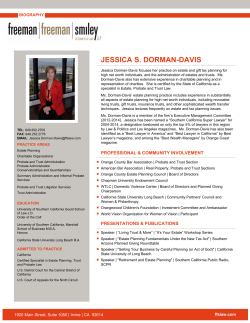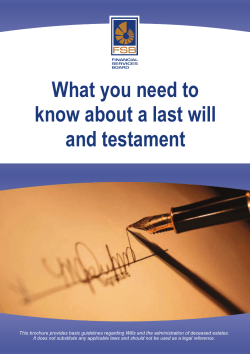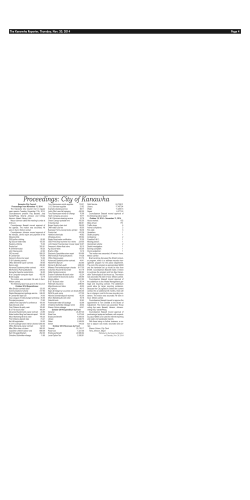
DO YOU HAVE A WILL?
DO YOU HAVE A WILL? What is a will? A will is a written legal document which sets out the way you want your property to be distributed when you die. It is the only way of making sure that your wishes are clearly communicated and can be acted upon. Why should I make a will? If you do not have a valid will when you die, your property will be distributed according to the laws of intestacy contained in the Administration and Probate Act 1929. This means that an administrator is appointed by a court to distribute your property to your next of kin (your relatives). If you do not have any relatives then your property goes to the ACT Government. Making a will also prevents unnecessary trauma and disputes between you and your loved ones about your property and wishes when you die. It is also essential to make a will if you have young children. A will allows you to appoint a guardian to look after your children if anything happens to you before they reach the age of 18. How should I make a will? You should not make a will by yourself, even if you don’t have much property. There is a risk that your home-made will may not comply with the necessary legal formalities and will be invalid. There are a number of ‘will kits’ that can be purchased from the newsagency, however they are not as reliable as seeking professional assistance. Legal Aid does not provide assistance in writing wills or administering a deceased’s estate. However it can give advice and help you identify will related issues. You should contact a private lawyer to discuss drafting your will. The ACT Law Society (6247 5700) can give you the names of some lawyers that specialise in wills. Alternatively, the ACT Public Trustee (6207 9800) charges nominal fees to draft a will but will also require that you appoint it as executor (with the result that the Public Trustee will receive a percentage of your estate when you die, as a fee for its services). Information about the Public Trustee’s fees and services are available on its website www.publictrustee.act.gov.au. Some helpful Legal Terms Estate – the property (including all assets and debts) of a person when they die. Testator – a person who makes a will. Executor – a person appointed by you in your will who is responsible for implementing your wishes when you die. Administrator – a person appointed by the court to administer your estate because no executor was appointed or you did not have a will. Beneficiary – a person who is entitled to your property in accordance with your will. Intestacy – the law relating to distribution of property if there is no will. Grant of probate – recognition by the court of the executor’s right to administer the deceased’s estate. Grant of administration of the will – recognition by the court of the administrator’s right to administer the deceased’s estate. Requirements for a valid will: You must be 18; It must be in writing; It must be signed by you in the presence of two witnesses (it is preferable that the witnesses are not beneficiaries who will receive property in your will) You must have the mental capacity to understand what you are doing. What should I do with my will? Once you have made your will you should keep it in a safe place. It is important that your executor knows where to find your will when you die. Usually the lawyer who prepares your will also keeps a copy. Who should I appoint as the executor? Most people appoint a capable family member or friend who they trust. You should consider appointing two independent executors just in case anything happens to either of them. It is not a problem to appoint someone who will also inherit property under your will. It is not a good idea to appoint your lawyer as they may change jobs later on or move away. What happens if I get married or divorced? If you get married after you make a will, it is automatically revoked (it becomes invalid). If you get divorced after you make a will, any gifts to your former spouse are automatically revoked. There are however some exceptions to these rules so it is a good idea to update your will if your marital status changes. Can I prevent relatives from inheriting my property? When you make your will you have the right to chose who will inherit your property. The only exception to this is where you are under a moral or financial obligation to provide for that person after you die. Under the Family Provision Act 1969, your spouse or partner, parents, children or grandchildren may apply for a court order for adequate provision for their maintenance, education and advancement in life. Can I revoke my will? You can revoke your will at any time by destroying it or replacing it with another valid will. If you get married, as noted above, this will also change the status of your will. Additional information You may also include information in your will about disposal of your body (including organ donation) and paying for your funeral. If you are worried about your health and future medical treatment you may consider making a living will or providing a Heath Direction under the Medical Treatment (Health Directions) Act 2006, which sets out your wishes if you are unable to make a decision. What happens when I die? The person who you appointed as executor of your will organises the funeral and administers your estate (either by themselves or with the assistance of a lawyer). If you own land, shares or a substantial sum of money, the executor will need to apply to the court for a grant of probate. If you didn’t appoint an executor, the administrator appointed by the court will need to apply for a grant of letters of administration. Both grants are legal recognition that the executor/administrator is entitled to distribute your property. It is not necessary to obtain a grant if you only have property such as a car, jewellery, paintings and other personal items. April 2013
© Copyright 2026











